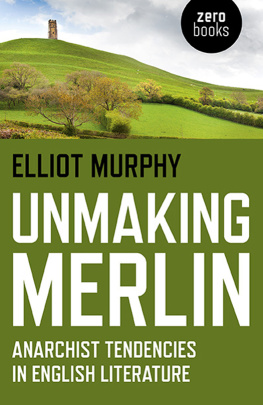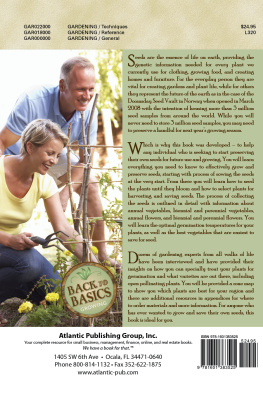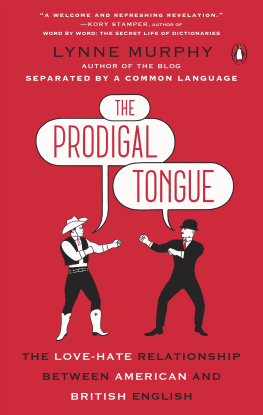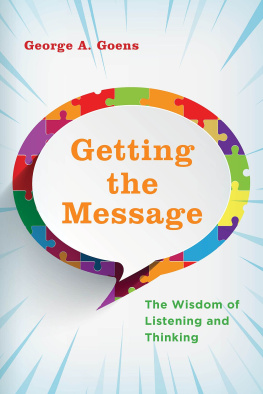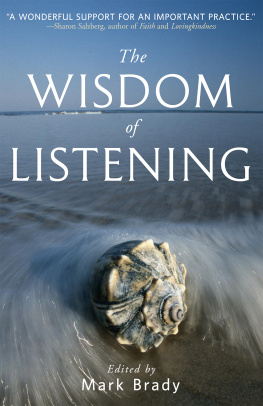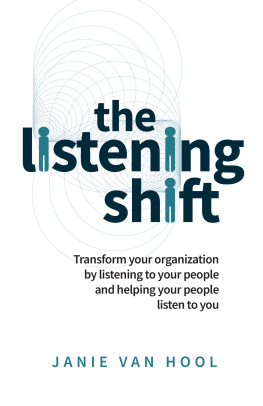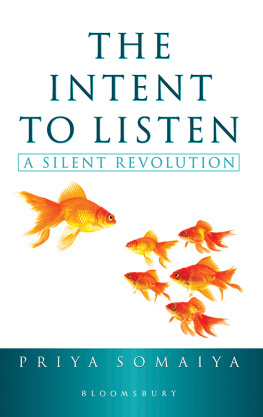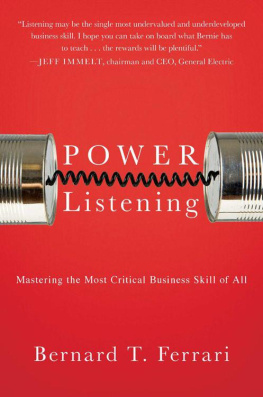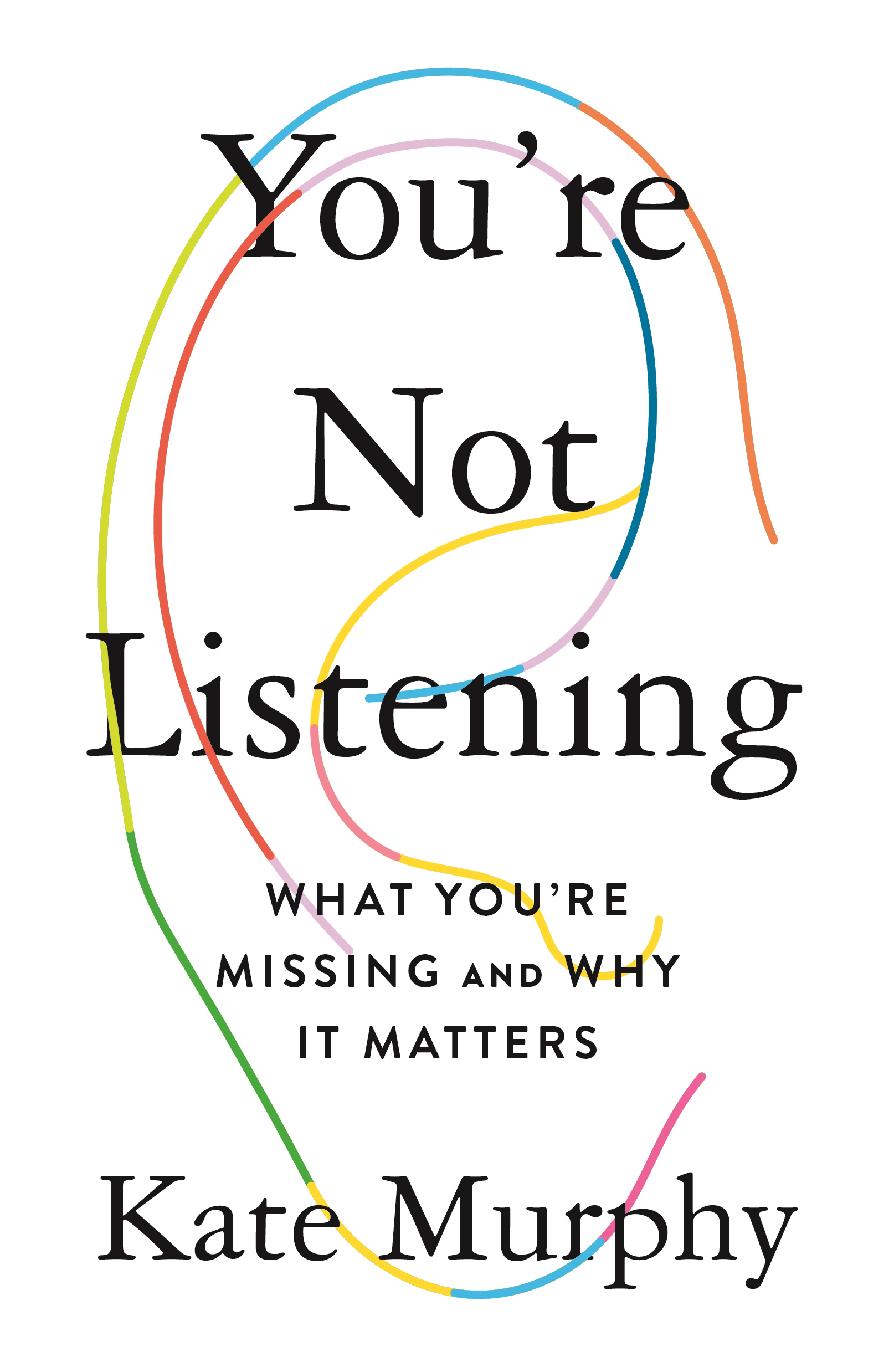The author and publisher have provided this e-book to you for your personal use only. You may not make this e-book publicly available in any way. Copyright infringement is against the law. If you believe the copy of this e-book you are reading infringes on the authors copyright, please notify the publisher at: us.macmillanusa.com/piracy.
When was the last time you listened to someone? Really listened, without thinking about what you wanted to say next, glancing down at your phone, or jumping in to offer your opinion? And when was the last time someone really listened to you? Was so attentive to what you were saying and whose response was so spot-on that you felt truly understood?
In modern life, we are encouraged to listen to our hearts, listen to our inner voices, and listen to our guts, but rarely are we encouraged to listen carefully and with intent to other people. Instead, we are engaged in a dialogue of the deaf, often talking over one another at cocktail parties, work meetings, and even family dinners; groomed as we are to lead the conversation rather than follow it. Online and in person, its all about defining yourself, shaping the narrative, and staying on message. Value is placed on what you project, not what you absorb.
And yet, listening is arguably more valuable than speaking. Wars have been fought, fortunes lost, and friendships wrecked for lack of listening. Calvin Coolidge famously said, No man ever listened himself out of a job. It is only by listening that we engage, understand, connect, empathize, and develop as human beings. It is fundamental to any successful relationshippersonal, professional, and political. Indeed, the ancient Greek philosopher Epictetus said, Nature hath given men one tongue but two ears, that we may hear from others twice as much as we speak.
So its striking that high schools and colleges have debate teams and courses in rhetoric and persuasion but seldom, if ever, classes or activities that teach careful listening. You can get a doctorate in speech communication and join clubs like Toastmasters to perfect your public speaking, but theres no comparable degree or training that emphasizes and encourages the practice of listening. The very image of success and power today is someone miked up and prowling around a stage or orating from behind a podium. Giving a TED Talk or commencement speech is living the dream.
Social media has given everyone a virtual megaphone to broadcast every thought, along with the means to filter out any contrary view. People find phone calls intrusive and ignore voicemail, preferring text or wordless emoji. If people are listening to anything, its likely through headphones or earbuds, where they are safe inside their own curated sound bubbles; the soundtracks to the movies that are their walled-off lives.
The result is a creeping sense of isolation and emptiness, which leads people to swipe, tap, and click all the more. Digital distraction keeps the mind occupied but does little to nurture it, much less cultivate depth of feeling, which requires the resonance of anothers voice within our very bones and psyches. To really listen is to be moved physically, chemically, emotionally, and intellectually by another persons narrative.
This is a book in praise of listening and a lament that as a culture we seem to be losing our listening mojo. As a journalist, Ive conducted countless interviews with everyone from Nobel laureates to homeless toddlers. I view myself as a professional listener, and yet, I, too, can fall short, which is why this book is also a guide to improving listening skills.
To write this book, I have spent the better part of two years delving into the academic research related to listeningthe biomechanical and neurobiological processes as well as the psychological and emotional effects. There is a blinking external hard drive on my desk loaded with hundreds of hours of interviews with people from Boise to Beijing, who either study some aspect of listening or whose job, like mine, is listening intensive; including spies, priests, psychotherapists, bartenders, hostage negotiators, hairdressers, air traffic controllers, radio producers, and focus group moderators.
I also went back to some of the most accomplished and astute individuals Ive profiled or interviewed over the yearsentertainers, CEOs, politicians, scientists, economists, fashion designers, professional athletes, entrepreneurs, chefs, artists, authors, and religious leadersto ask what listening means to them, when they are most inclined to listen, how it feels when someone listens to them, and how it feels when someone doesnt. And then there were all the people who happened to sit next to me on airplanes, buses, or trains or who perhaps encountered me at a restaurant, dinner party, baseball game, grocery store, or while I was out walking my dog. Some of my most valuable insights about listening came from listening to them.
Reading this book, youll discoveras I didthat listening goes beyond just hearing what people say. Its also paying attention to how they say it and what they do while they are saying it, in what context, and how what they say resonates within you. Its not about simply holding your peace while someone else holds forth. Quite the opposite. A lot of listening has to do with how you respondthe degree to which you elicit clear expression of another persons thoughts and, in the process, crystallize your own. Done well and with deliberation, listening can transform your understanding of the people and the world around you, which inevitably enriches and elevates your experience and existence. It is how you develop wisdom and form meaningful relationships.
Listening is something you do or dont do every day. While you might take listening for granted, how well you listen, to whom, and under what circumstances determines your lifes coursefor good or ill. And, more broadly, our collective listening, or the lack thereof, profoundly affects us politically, societally, and culturally. We are, each of us, the sum of what we attend to in life. The soothing voice of a mother, the whisper of a lover, the guidance of a mentor, the admonishment of a supervisor, the rallying of a leader, the taunts of a rival are what form and shape us. And to listen poorly, selectively, or not at all is to limit your understanding of the world and deprive yourself of becoming the best you can be.
I was sitting on the floor of my bedroom closet interviewing Oliver Sacks. Construction across the street from my apartment made the closet the quietest place I could go. So there I was, sitting cross-legged in the dark, pushing dangling dresses and pants legs away from the mic of my telephone headset while talking to the eminent neurologist and author, best known for his memoir Awakenings, which was made into a film starring Robin Williams and Robert De Niro.
The purpose of the interview was to talk about his favorite books and movies for a short column in the Sunday Review section of The New York Times. But we had left Baudelaire behind and plunged headlong into a discussion of hallucinations, waking dreams, and other phenomena that affect what Sacks poetically called the climate of the mind. As my dog scratched at the closet door, Sacks described the climate of his own mind, which was at times clouded by an inability to recognize faces, including his own reflection. He also had no sense of direction, which made it hard for him to find his way home even after taking a short walk.



